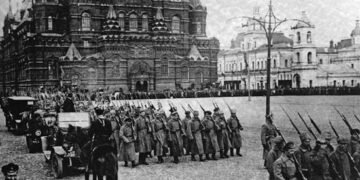The Bolshevik Revolution of 1917 took place on the days Russians then (using the old Julian calendar) called October 25th through the 27th. The western world (on the Gregorian calendar) called and still calls those days November 7 – 9th.
This means that the one century mark is upon us. Though the party that could trace its direct descent from Lenin and his associates lost power in Russia in 1991, the events of 74 years before that retain their significance and their polarizing power.
It is well to start any discussion by looking at the dynamics of the year 1917 as a whole. The country had been at war since 1914, and the hardships of that war had discredited the Romanovs in the eyes of much of the populace. In February (March New Style) a number of protests and strikes spread throughout the city of Petrograd, culminating in the fall of the Romanov dynasty and the creation of a Provisional Government.
In April (May) the leadership of this provisional government informed the allied powers that Russia was going to remain on their side in the continuing war with Germany and Austro-Hungary. This was a very unpopular stand for it to take – there was a great hunger for peace on the streets of Petrograd – and soon thereafter the government had to allow Communists into its ruling coalition, though the Communists who joined it at this time were the “Mensheviks,” that is, the faction of the CP that believed (to simplify wildly) that it was acceptable for Communists to support the war effort, and thus national defense, under a mostly non-Communist regime. This Lenin, and the “Bolshevik” faction, stoutly denied.
The revolution of October (November) then, wasn’t a revolution against a monarchy – the defeat of which had already been accomplished. It was a revolution against a fledgling “bourgeois” democracy and even against those Communists who thought the “dialectical moment” was such as to encourage working within and through such a democracy.
Left Wing View
Twenty-six years after 1991, there are still those who think October/November 1917 is something to celebrate.
The publication EurasiaNet, which focuses on Central Asian affairs, observed in its anniversary piece that “all five Central Asian states still bear a heavy Soviet imprint in their governance, institutions, and identity.” The five states referenced there are: Kazakhstan, Kyrgyzstan, Uzbekistan, Turkmenistan, and Tajikistan.
The EurasiaNet article, by Alexander Morrison, says that the Bolsheviks brought with them “a radically modernizing regime that transformed what had been a culturally and politically unassimilated colony of the Tsarist Empire into the nation states we know today.” Morrison does not see that as something that they ought to be trying to live down.
The online journal LeftVoice.org acknowledges that “the feeling among most Russian people about the Revolution is less than celebratory,” because they associate the revolution with the “bureaucratic and corrupt nature of Stalin and the post-Stalin regimes.” The author of LeftVoice’s anniversary story, Anna Malyukova, is unhappy about this. She believes that Stalin betrayed Bolshevism, to which in its pure original form she attributes “uniqueness, foresight, and true commitment,” which she hopes Russia will someday recover as well as celebrate.
Right Wing View
But of course many on the right (and in the center, and for that matter in the center-left in the U.S. and many other western countries) would firmly deny that there was a pure form of Bolshevism innocent of the subsequent crimes.
On twitter, LibertyPike says that she is “pausing to remember the 100 million victims” of the Bolsheviks.
In National Review, Douglas Murray offers the arithmetic behind that figure LP uses, “100 million” killings. It includes 20 million in the USSR, 65 million produced by the arrival of Communism in China, 2 million in Cambodia, another 2 million (and counting, Murray reminds us) in North Korea, and so forth.
Personal Thought
In general, I submit, we need not join Ms. Malyukova in mourning the revolution stolen from the early Leninists by Stalin and his heirs. We ought to mourn instead the revolution stolen by Lenin and that circle, as well as by their successors, from the less dialectically gifted by vastly more humane revolutionaries of February.
Behind Lenin there is Marx, and behind Marx there is Hegel, the academic scribbler at whose feet most of the political evils of the 20th century may be set. The Bolshevik Revolution in Russia was one of many points on the ugly timeline of Hegelianism and its consequences.
From the web
The latest trend and news for the people by the people. Left right and center all in one place.






















































